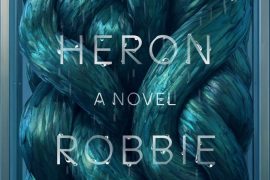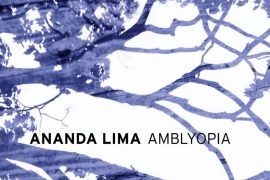One of the true glories of a well-executed short story collection is for the whole to greatly exceed the sum of its parts: Nine Bar Blues, Sheree Renée Thomas’ debut all-fiction collection, delivers. Over the course of sixteen short stories, two or three of which might be called “novellae,” Thomas gives us gently shimmering ecotheological assertions, unflinchingly human lessons on race, and a voice that will heal as thoroughly as it mortifies.
Subtitled “Stories from an Ancient Future,” time is both traveled through and transcended, tying Thomas’ sci-fi street cred to rich roots in the Mississippi Delta, digging deep into the past of documented history, but also climbing through folk legend, back to sacred African spirit ways. Both the Bible and the baobab rustle their leaves and bend down their branches to let us be hoisted in and embraced by wonder.
The collection begins with “Ancestries,” a bizarre, mystically dense story that serves as a warning to readers, not merely of the sort of damage that can be done to the world we inhabit and the terrifying consequences that might result, but of the framework for the collection. If readers are not willing to be made uncomfortable, if we are not willing to be confused, then Thomas is perhaps not the right writer for our needs. She has a tendency to whip off the tablecloth of natural assumptions from beneath the dishes of a story: if we cannot, for the duration of the book, treat reality as a thin and frictionless veil that touches a very small part of experience, we will engage with this collection as if it were a pile of shattered porcelain. But for those willing to play by Thomas’ rules, the story reaches out its hand and invites us in, saying, “We are sisters. We share the same sky.”
After our introduction, we are primed with the familiar imagery of Abrahamic traditions, gradually dipping more deeply into creolism and syncretism, wading further into new worlds.
Immediately following “Ancestries,” we enter “Thirteen Year Long Song,” in which Thomas reimagines the Exodus in a small town that has been plagued by fracking, among other environmental insults.
“Aunt Dissy’s Policy Dream Book” introduces us to vital, recurring characters that are, themselves, the very concept of moral heritage, while taking us into the tumultuous world of dreams we are too scared to speak of honestly. Within them, we are reminded of other ways of listening, “Aunt Dissy taught me the language of trees,” our young narrator confides, “Sometimes they offer you real clues. Most of the time they’re just bitching. This one complains about a bruise, a burden too heavy, a man named Iudas.” The story speaks to Thomas’ specialties: braiding pain and beauty together, exploring the perfect, awkward accident that is intimacy and the space-making magic of love; the way that the commitment of another ugly, mortal heart can build an addition onto one’s own—how the restlessness of the other can be the only bed we can lie in with some peace.
While “Aunt Dissy” might make us think of Joseph and his journey down to the house of Pharaoh, “Nightflight” brings us back into a plague of darkness over Memphis, echoing not Egypt, but the story of Sodom. Next, “River Clap Your Hands,” its title alluding to Psalms, repositions baby Moses in the floodwaters of Katrina.
As soon as Thomas feels that the reader might be comfortable in her footing, knowing that this book is a ground for dancing rather than standing still, she becomes more playful and curious, introducing challenging new spaces: futures, internal worlds, undergrounds. We explore images —and potential complications—of Black liberation. We join God as she swings inside an inner city lunch lady, the glory of her flabby arms mixing up a tuna salad likened to that of a hurricane. We see the ecology of humanity, the connectedness that exists even in urban spaces and how, sometimes, the bad is for the good is for the worst is for the best. We are tenderly fed savory, complex, bites of redemption—bound together by the Divine’s preferred “real mayo.” We travel the world and sink into the flooded pyramids of Sudan to hear the collection of all the sounds of our human earth, our painful and perfect truth. We find the horror and power that lurks within the oppressed, consider both sides of the smokescreens of glamor, feel the crushing pressure of misogynoir and the enormous strength of sisterly love, we consider a stairway to heaven in a would-be crackhouse. Thomas lowers us down into a crystal ball of possibility, probability, and perspective, but never shakes us off the finger of security we cling to in her warm and faithful voice.
And after that whirlwind trip, we should be emotionally prepared for the two longest works in the collection: “Shanequa’s Blues—Or Another Shotgun Lullaby,” an international quest for cures and curiosities we have been taught do not exist, but that a defiantly-loving heart will pursue across the windy highwire of life, and “Madame & The Map: A Journey In Five Movements,” a sprawling slave epic that forcibly bends the moral arc of the universe towards justice, all well-worked hands on deck: magic, nature, faith, human frailty.
In “Shanequa’s Blues,” readers meet a young girl who is full of suffering. Some of it seems to come from within, a fate that can’t translate beyond the bounds of spirit. Some blatantly comes from the world she is born into. She tells us, in her sweet words, that “a child is a sacred thing,” but makes it clear to us that not every adult in her life has understood.
Brenda, Shanequa’s mother, seems to know what terror has fallen upon her daughter. But she does not regard it with the quaint assumption that she could hold back the consuming tide of human harm that she, herself, had choked on the waters of. We feel her desire to rip up the entire ocean of sin and clean it of its salt. But we see with clear eyes the enormity of such a task, the futility of her trying to make an attempt while her clunker won’t even start.
When Mopti, an unlikely helpmeet, and Brenda follow a map to the burial grounds where they might dig a great song of healing up from beneath the Tree of Life, they are confronted by the presence of two trees: a scene familiar from Eden. They only have enough time to make the right choice.
Some readers have criticized Thomas’ work for its depictions of and use of abuse as story element, but she handles it with her own touch. Never the jarring white trauma Alice Munro would hem in with taxidermy, but a reality taken as both practical nuisance and spiritual conundrum, those things which we know are done, but struggle to undo, strange fruits that generation after generation try and fail to uneat, to Heimlich out of each other. Thomas never pretends that we can just dab a little spit on the stem and stick it back to the branch, but rather shows us fully fallen: all of our skinned knobby knees and scraped up shins, seeking a song that can repair the irreparable without permitting her adult characters the saccharine diversion into victim-as-martyr narrative.
“Madame & The Map” is a strange, decadent, soulful adventure in which every crumb and crevice of the planet seems to be trying to sing itself free. We start off in a kitchen, “and what a kitchen that was, a fireplace as wide as a room with the dishes scattered as far as any eye could see and the skillets stacked up like Jacob’s Ladder, teetering and tottering so high we knew the angels could smell the pork and dumplings way up in heaven.” We move between the voices of an enslaved person, a bit-more-than-human member of a traveling freak show, someone who has spent much of his lifetime selling others, stone, and a river. Each singer adds color to the elusive thing we call freedom, asking whether it can be partial, and who or what makes it possible.
The collection closes with two enchanting pieces that seem, at first, as though they are only holding their places among the other stories with the thinnest thread.
But in “Teddy Bump,” we enter a brutal, mystical landscape where we are confronted, again, with the question of what we take from our children. Many contemporary faith traditions engage with ideas about child sacrifice, and modern practice still abounds. While most of us are not passing our children through the fire to Molech, we know that innocence and innocents are routinely used to sate ego and economy, childhoods given over to adult desires and the pyres of systemic moral injustice. In removing a group of young girls from the familiar world, all who were presumably given up as offerings on the altars of grown men, Thomas extends to a creature from beyond our sensibilities the opportunity to exploit children, begging questions about the ethics that might exist on high. Poignantly, of all the things the girls miss in this place, we find the longing for the feeling of our toes in grass, however dry and jagged, a reminder that what we steal from children is not limited to those sizable dignities, but can stack up straw by straw in deprivation of the delights of basic human experiences.
The final piece, short and sweet, “The Origins of Southern Spirit Music,” reminds us of what we can give to our children, the children of our respective villages, whatever our relation to the newest generation might be: music, a balm or purpose for all of this recycled and upcycled pain, and perhaps more, perhaps a world they can live in, dance in, sing, and clap their hands in. Even if most of the singing is undoubtedly blues.
Thomas has thrust her work into conversation with Hughes and Kafka, her voice informed by Octavia Butler, and perhaps Gil Scott Heron, her mind full of Hebrews and haints. While she has managed to slide quite a bit of her acclaimed poetry into the recognizable indents and margins of prose, we are still treated to the occasional dollop of a poem-in-form, as if she’s sneakin’ us a little sweet after an already satisfying meal. This is kind of Thomas, and smart of her: much of this work is difficult to digest, whether in the marrow of emotion or the delicate machinery of philosophy that she is so keen on pushing against.
The great achievement of Nine Bar Blues rests in how much diversity it brings into cohesion: futures, pasts, presents; near, far, within; foreign, familiar, foundational. With a sharp yet loving eye on the ugliness of the world and a wide material range, this collection centers on the painful hope found in the dance between criticism and progress, human failings and communal betterment, all while inviting us to enjoy the struggle. Some might seek to chide Thomas for her apparent belief in the possibility of forgiveness for past sins against people, planet, and the Divine. But only imperfect people, the kind she deals in and speaks to, need forgiveness. She leaves the space for its roots and its branches. She instructs us in all the melodies and rhythms that need to fall together for any bit of recompense to ring real and true.





